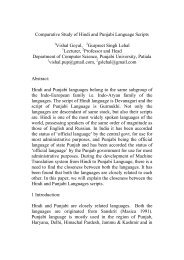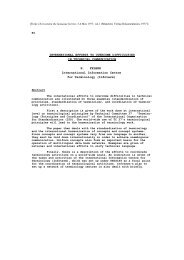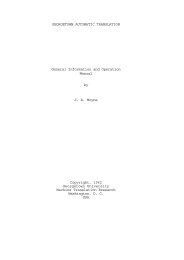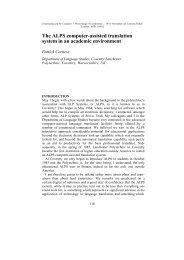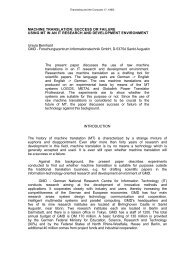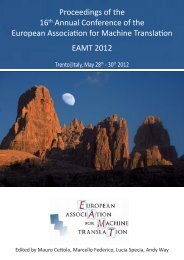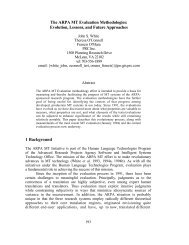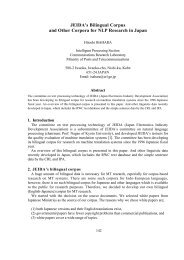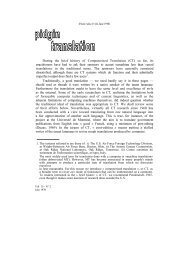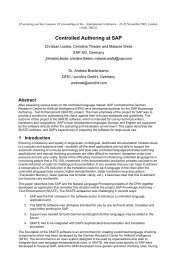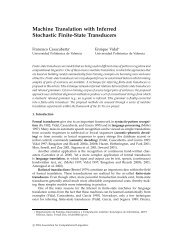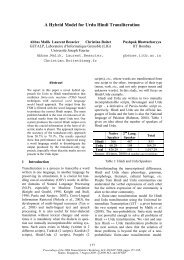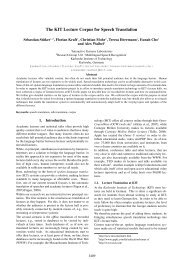Thye World Wide Web as a resource for example-based machine ...
Thye World Wide Web as a resource for example-based machine ...
Thye World Wide Web as a resource for example-based machine ...
Create successful ePaper yourself
Turn your PDF publications into a flip-book with our unique Google optimized e-Paper software.
The standard w<strong>as</strong> created by eliminating all phr<strong>as</strong>es in the dictionary<br />
which were not transparent translations of their subparts. We tested two<br />
language directions: German-to-English and Spanish-to-English. To find<br />
compositional noun phr<strong>as</strong>es in this multilingual dictionary, we extracted<br />
two complete sets of all German compound nouns and all Spanish<br />
nominal phr<strong>as</strong>es satisfying the four criteria:<br />
i. [compound] the dictionary entry w<strong>as</strong> decomposable into two other<br />
Spanish or German words found in the dictionary,<br />
ii. [compositionality] the compound term w<strong>as</strong> translated in the English<br />
part of the dictionary by two word phr<strong>as</strong>es,<br />
iii. [transparency] the words in the English translations of the smaller<br />
German or Spanish components permitted the construction of<br />
candidate translations that included the dictionary-given compoundword<br />
translation, and<br />
iv. [ambiguity] there w<strong>as</strong> more than one possible English translation<br />
candidate.<br />
These sets of words, then, correspond to the entire list of German<br />
compounds and Spanish terms in this full-size dictionary such that, if<br />
they were not in the dictionary, their proper English translation could be<br />
constructed from the translation of the subparts of the German word or<br />
Spanish term using that same dictionary. Only such words which had<br />
ambiguous translations were retained. This strategy led to a set of 724<br />
German words constituting our gold standard of potentially ambiguous<br />
compositional German compounds, and a set of 1140 compositional<br />
Spanish terms. With each German word or Spanish term, we also have<br />
their preferred 6 English translations.<br />
For each German word and <strong>for</strong> each Spanish term, we then ignored the<br />
dictionary entry <strong>for</strong> the compound, and created the English candidate<br />
translations <strong>as</strong> if the non-English term were not included in the<br />
dictionary. This situation reproduces what human users must do <strong>for</strong> most<br />
novel German compounds or novel Spanish terms encountered. In each<br />
c<strong>as</strong>e, we created all the possible two word translations using the<br />
decomposed 7 German word and the individual words of the Spanish<br />
terms (ignoring prepositions) and recombining the English translations of<br />
these subparts from the German-to-English or Spanish-to-English sides<br />
of the same dictionary.<br />
6<br />
By preferred, we mean what our dictionary gives <strong>as</strong> a translation of the term. One<br />
might raise the question about whether the dictionary might be wrong in this sense, but<br />
to remain objective, we considered that the dictionary w<strong>as</strong> always right.<br />
7<br />
Decomposed using techniques described in (Schiller, 1996).



